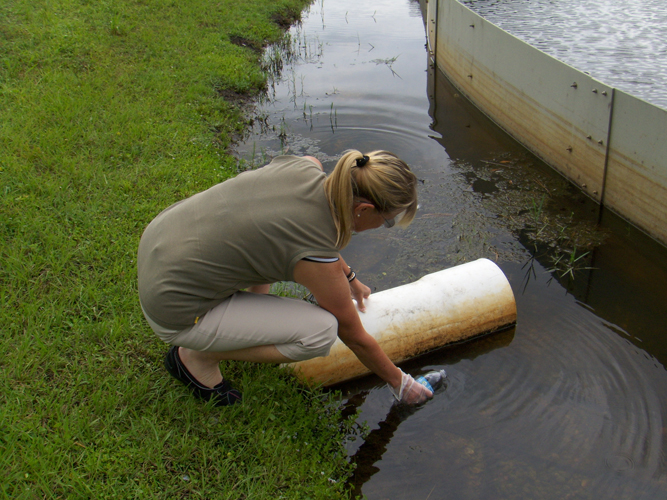SEBASTIAN — The City of Sebastian has a new device to help test water quality in various areas of the city, to see how much the city itself is contributing to lagoon pollution.
City environmental specialist Cynthia Watson and City Engineer Frank Watanabe introduced the handheld water quality testing device, the DR 900, at the June 25 city council meeting, and said they’re already using it.
Watson and Watanabe unveiled a testing schedule they have established, which will use data from previous city outfall samples as a base and compare them with ongoing figures generated from measurements using the new device.
So far, said Watanabe, “the machine is doing a pretty good job,” producing data in line with previously gathered data.
Existing data comes from tests taken at Periwinkle Pond in 2009; in the Collier Canal in 2011; and at the Washington Street and Cleveland Street outfalls this year.
Tests were performed for Kjeldahl nitrogen, total nitrogen and phosphorous, in milligrams per liter.
Watanabe said samples from the five locations will be tested for nitrogen, phosphorous and nitrates on a regular basis, possibly quarterly or even monthly.
The council had authorized the acquisition of the new measuring device to obtain local data on how many pollutants are entering the lagoon from local sources in Sebastian, rather have to rely on data from others taken elsewhere.
The council had expressed concern that local decisions on lagoon protection should be based on local data, rather than data from areas with different pollution issues.
Kjeldahl nitrogen is named after Johan Kjeldahl, a Danish chemist who, in the late 1800s, developed a method for determining the amount of nitrogen in certain organic compounds, using a method which came to be named after him.
Total Kjeldahl nitrogen (TKN) is the sum of organic nitrogen, ammonia (NH3), and ammonium (NH4+) in the chemical analysis of soil, water and wastewater.
To calculate Total Nitrogen (TN), the concentrations of nitrate-N and nitrite-N are determined and added to the total Kjeldahl nitrogen.
Today, total Kjeldahl nitrogen is a required parameter for regulatory reporting at many treatment plants.

